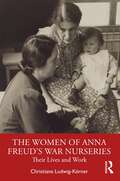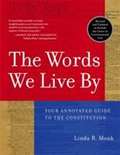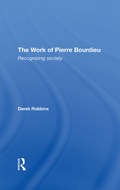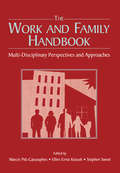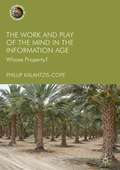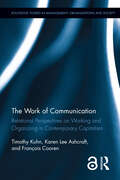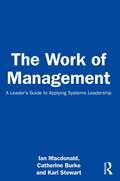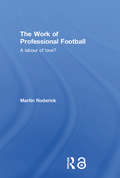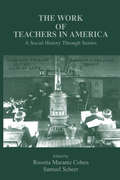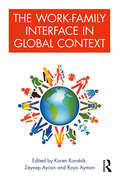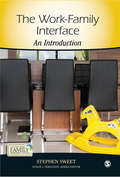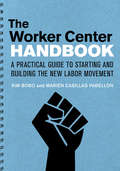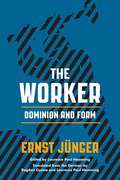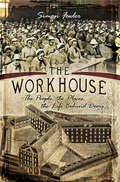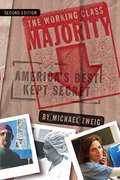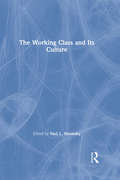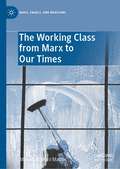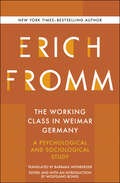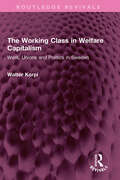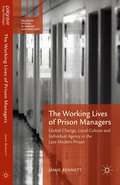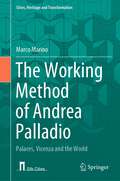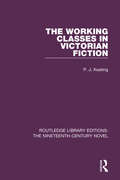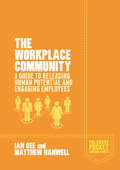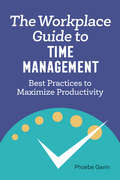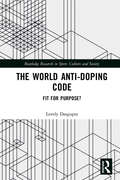- Table View
- List View
The Women of Anna Freud’s War Nurseries: Their Lives and Work
by Christiane Ludwig-KörnerIn this volume, Christiane Ludwig-Körner describes the lives and work of the staff members of the War Nurseries set up and run by Anna Freud and Dorothy Burlingham during the Second World War.The Women of Anna Freud’s War Nurseries looks in turn at each of the women who helped run the homes in Hampstead: Alice Goldberger, Sophie and Gertrud Dann, Manna Friedmann, Anneliese Schnurmann, Ilse Hellman and Hansi Kennedy. As young women, they narrowly escaped the Holocaust and dedicated themselves to children who had suffered the same fate. Few arrived with any knowledge of psychoanalytic theories or methods; this volume charts their education from Freud and Burlingham, which eventually lead to both Freud’s independent psychoanalytic child therapy training and the young women’s embarkment on careers as professional analysts. Using case studies throughout, Ludwig-Körner illustrates the intense relationships often experienced between children in care and their analysts/carers, and uses the children of the War Nurseries as examples for how contemporary psychoanalysts can work with children today.This book is essential reading for psychoanalysts, especially those working with children, as well as scholars and professionals interested in the history of child analysts and childhood trauma.
The Words We Live By: Your Annotated Guide to the Constitution
by Linda R. MonkFrom the book: In this book, you will hear the voices of America's founders and fanatics, of Supreme Court justices and civil rights workers. Among this cacophony are rock star Ted Nugent, first-grader Ruby Bridges, actor Charlton Heston, gay rights activist Michael Hardwick, ex-con Clarence Earl Gideon, and pro-life protester Norma McCorvey. As these stories prove, the Constitution is not self-enforcing and depends upon citizens for its support. Judge Learned Hand emphasized this fact during World War II: I often wonder whether we do not rest our hopes too much upon constitutions, upon laws, and upon courts. These are false hopes; believe me, these are false hopes, liberty lies in the hearts of men and women; when it dies there, no constitution, no law, no court can save it. For the Constitution to have meaning, it must be not only the words we recite, but also the words we live by. [This text is listed as an example that meets Common Core Standards in English language arts in grades 6-8 at http://www.corestandards.org.]
The Work Of Pierre Bourdieu: Recognizing Society
by Derek RobbinsThis book seeks to offer a chronological account of the development of Pierre Bourdieu's thinking. It is intended to guide readers towards and through the original texts and attempts to represent the French meaning of Bourdieu, hence the concentration on the French chronology.
The Work and Family Handbook: Multi-Disciplinary Perspectives and Approaches
by Ellen Ernst Kossek Marcie Pitt-Catsouphes Stephen SweetThe Work and Family Handbook is a comprehensive edited volume, which reviews a wide range of disciplinary perspectives across the social sciences on the study of work-family relationships, theory, and methods. The changing demographics of the labor force has resulted in an expanded awareness and understanding of the intricate relations between work and family dimensions in people's lives. For the first time, the efforts of scholars working in multiple disciplines are organized together to provide a comprehensive overview of the perspectives and methods that have been applied to the study of work and family. In this book, the leading work-family scholars in the fields of social work, psychology, sociology, organizational behavior, human resource management, business, and other disciplines provide chapters that are both accessible and compelling. This book demonstrates how cross-disciplinary comparisons of perspective and method reveal new insights on the needs of working families, the challenges faced by those who study them, and how to formulate policy on their behalf.
The Work and Play of the Mind in the Information Age: Whose Property? (Frontiers of Globalization)
by Phillip Kalantzis-CopeThis book tells a series of living stories about a domain of social activity, "the work and play of the mind," in a particular historical epoch: the "information age. " The stories concern political processes and movements as varied as the World Trade Organization's Trade-Related Aspects of Intellectual Property Rights, China's Great Firewall, practices of image sharing in social media, Occupy Wall Street, The Arab Spring, The Alt-Right, and the use of geographical indications by indigenous peoples and farmers to defend their lifestyles. In its theoretical analysis, the book illuminates four alternative political agendas for the work and play of the mind. These four "propertyscapes" represent competing visions for social life, framing projects for collective political action that are at times competing, at times overlapping. The author prompts us to consider whose property is the work and play of the mind, as well as addressing larger questions regarding the framing of political space, the kinds of political communities we may need for the future, and the changing place of the work and play of the mind within these social imaginaries. The book will be of interest to students and scholars across a range of disciplines including media and communications, arts and design, law, politics and interdisciplinary social sciences.
The Work of Communication: Relational Perspectives on Working and Organizing in Contemporary Capitalism (Routledge Studies in Management, Organizations and Society)
by Timothy Kuhn Karen L Ashcraft Francois CoorenThe Work of Communication: Relational Perspectives on Working and Organizing in Contemporary Capitalism revolves around a two-part question: "What have work and organization become under contemporary capitalism—and how should organization studies approach them?" Changes in the texture of capitalism, heralded by social and organizational theorists alike, increasingly focus attention on communication as both vital to the conduct of work and as imperative to organizational performance. Yet most accounts of communication in organization studies fail to understand an alternate sense of the "work of communication" in the constitution of organizations, work practices, and economies. This book responds to that lack by portraying communicative practices—as opposed to individuals, interests, technologies, structures, organizations, or institutions—as the focal units of analysis in studies of the social and organizational problems occasioned by contemporary capitalism. Rather than suggesting that there exists a canonically "correct" route communicative analyses must follow, The Work of Communication: Relational Perspectives on Working and Organizing in Contemporary Capitalism explores the value of transcending longstanding divides between symbolic and material factors in studies of working and organizing. The recognition of dramatic shifts in technological, economic, and political forces, along with deep interconnections among the myriad of factors shaping working and organizing, sows doubts about whether organization studies is up to the vital task of addressing the social problems capitalism now creates. Kuhn, Ashcraft, and Cooren argue that novel insights into those social problems are possible if we tell different stories about working and organizing. To aid authors of those stories, they develop a set of conceptual resources that they capture under the mantle of communicative relationality. These resources allow analysts to profit from burgeoning interest in notions such as sociomateriality, posthumanism, performativity, and affect. It goes on to illustrate the benefits that investigations of work and organization can realize from communicative relationality by presenting case studies that analyze (a) the becoming of an idea, from its inception to solidification, (b) the emergence of what is taken to be the "the product" in high-tech startup entrepreneurship, and (c) the branding of work (in this case, academic writing and commercial aviation) through affective economies. Taken together, the book portrays "the work of communication" as simultaneously about how work in the "new economy" revolves around communicative practice and about how communication serves as a mode of explanation with the potential to cultivate novel stories about working and organizing. Aimed at academics, researchers, and policy makers, this book’s goal is to make tangible the contributions of communication for thinking about contemporary social and organizational problems.
The Work of Management: A Leader’s Guide to Applying Systems Leadership
by Ian Macdonald Catherine Burke Karl StewartThe Work of Management demonstrates how the concepts, models and tools of Systems Leadership can be applied, enabling you to become a more effective manager by improving your own work to create a more positive and effective organisation.Positive organisations, where people come together to achieve a productive and personally satisfying purpose, and which provide the basis for a good society, do not occur by chance. They are created by the work of leaders and members who are dependent upon the way the organisation is designed and operates – its structure and systems. While the theory is explained, this book primarily presents the practical aspects – the specific values, methods and tools – that can be used to improve work and the work performance of direct reports. Building on the bestselling book Systems Leadership, this book provides leaders with a manual for the application of concepts as well as an introduction to Systems Leadership Theory, a method that has been used successfully by businesses from large multinational firms and banks, to SMEs, public agencies and NGOs. It provides a predictive capability, allowing a leader to predict what will work well and what is likely to fail, according to the context. It gives the benefit of foresight as decisions must be made.Designed as a leader’s manual for the application of the concepts around Systems Leadership, this book is for people who want to improve their own, and their organisation’s, work practices and performance.
The Work of Professional Football: A Labour of Love?
by Martin RoderickA long-term study providing rare insights into the precarious career and ordinary working culture of professional footballers. Away from the celebrity-obsessed media gaze, the work of a professional footballer is rarely glamorous and for most players a career in football is insecure and short-lived. A former professional, Martin Roderick’s familiarity with the world of football is the foundation for this privileged research into a world that is typically closed to the public gaze and ignored by media reportage and academic research which prefers to focus on a small, unrepresentative group of elite players. Key themes explored within the text include: the culture of work in professional football the changing identity, orientation and expectations of players during their careers the fragile and uncertain nature of professional sport careers the performance and dramatic aspects of a career under public scrutiny the role of relationships with managers, owners, support staff and partners players' responses to the insecurities inherent in professional football such as injury, ageing, performance and transfer. The text deals with a wide range of issues of interest to sports students and academics, particularly those with a focus on the sociology of sport but also including sport development, sport management and coaching studies. The text will also be of interest to researchers in the fields of careers, industrial relations and the sociology of work.
The Work of Teachers in America: A Social History Through Stories
by Rosetta Marantz Cohen Samuel ScheerThis volume presents a complex portrait of the American teacher through a fascinating range of "story" narratives, including fictional short stories, poetry, diaries, letters, ethnographies, and autobiographies. Through these stories, the volume traces the evolution of the teacher and the profession over the course of two centuries -- from the late 1700s to the late 1900s. In depicting the profession over time, the authors include stories by and about both male and female teachers, as well as teachers from a wide range of cultural and ethnic backgrounds, including white, black, Hispanic, Asian-American, immigrant and native-born, and gay and straight. This book offers accessible, comprehensive introductions to both the central ideas associated with each period and to the representative individual stories that are included within it. The volume editors connect each of the parts to earlier and later ones by tracing evolving themes of feminization, teacher activism, conceptions of curriculum and discipline, and issues of multiculturalism. Questions, suggested readings, and activities are offered at the end of each section. Photographs and drawings -- retrieved from state historical archives -- provide telling images of the teacher in each of the four periods.
The Work-Family Interface in Global Context
by Zeynep Aycan Karen Korabik Roya AymanBased on a sweeping, ten country study, The Work-Family Interface in Global Context comprises the most comprehensive and rigorous cross-cultural study of the work-family interface to date. Just as work-family conflict is associated with negative consequences for workers, organizations, and societies, so too can the work and family domains interact positively to enhance or enrich one another. Drawing on qualitative, quantitative, and policy-based data, chapters in this collection explore the influence of culture on the work-family interface in order to help researchers and managers understand the applicability of work-family models in a variety of contexts and further conceptualize work-family interactions through the development of a more universal knowledge. Members of the Project 3535 Team: Karen Korabik, University of Guelph, Canada.Zeynep Aycan, Koç University, Turkey.Roya Ayman, Illinois Institute of Technology, USA.Artiawati, University of Surabaya, Indonesia.Anne Bardoel, Monash University, Australia.Anat Drach-Zahavy, University of Haifa, Israel.Leslie B. Hammer, Portland State University, USA.Ting-Pang Huang, Soochow University, Taiwan.Donna S. Lero, University of Guelph, Canada.Tripti Pande-Desai, New Delhi Institute of Management, India.Steven Poelmans, EADA Business School, Spain.Ujvala Rajadhyaksha, Governors State University, USA.Anit Somech, University of Haifa, Israel.Li Zhang, Harbin Institute of Technology, China.
The Work-Family Interface: An Introduction
by Stephen A. SweetThis brief and accessible title integrates contemporary scholarly research with compelling vignettes to make it appealing to both instructors and undergraduate audiences. While focused on the United States in respect to its target audience and emphasis, it contains considerable international data that compares and contrasts social policies adopted in Europe and elsewhere. In so doing, it shows both the strengths and the limitations of the approaches used in the U.S. This title is the only single source that summarizes the origins of work–family concerns, the diversities of needs and experiences, the impact of tensions on the family front, the consequences of tensions for employers, and different types of policies that can make meaningful differences not only in the lives of employees, but also potentially in job quality and national productivity.
The Worker Center Handbook: A Practical Guide for Starting and Building the New Labor Movement
by Kim Bobo Marien Casillas PabellonWorker centers are becoming an important element in labor and community organizing and the struggle for fair pay and decent working conditions for low-wage workers, especially immigrants. There are currently more than two hundred worker centers in the country, and more start every month. Most of these centers struggle as they try to raise funds, maintain stable staff, and build a membership base. For this book, Kim Bobo and Marién Casillas Pabellón, two women with extensive experience supporting and leading worker centers, have interviewed staff at a broad range of worker centers with the goal of helping others understand how to start and build their organizations. This book is not theoretical, but rather is designed to be a practical workbook for staff, boards, and supporters of worker centers.Geared toward groups that want to build worker centers, this book discusses how to survey the community, take on an initial campaign, recruit leaders, and raise seed funds. Bobo and Casillas Pabellón also provide a wealth of advice to help existing centers become stronger and more effective. The Worker Center Handbook compiles best practices from around the country on partnering with labor, enlisting the assistance of faith communities and lawyers, raising funds, developing a serious membership program, integrating civic engagement work, and running major campaigns. The authors urge center leaders to both organize and build strong administrative systems. Full of concrete examples from worker centers around the country, the handbook is practical and honest about challenges and opportunities.
The Worker: Dominion and Form
by Laurence Paul Hemming Bogdan Costea Ernst JüngerWritten in 1932, just before the fall of the Weimar Republic and on the eve of the Nazi accession to power, Ernst Jünger's The Worker: Dominion and Form articulates a trenchant critique of bourgeois liberalism and seeks to identify the form characteristic of the modern age. Jünger's analyses, written in critical dialogue with Marx, are inspired by a profound intuition of the movement of history and an insightful interpretation of Nietzsche's philosophy. Martin Heidegger considered Jünger "the only genuine follower of Nietzsche," singularly providing "an interpretation which took shape in the domain of that metaphysics which already determines our epoch, even against our knowledge; this metaphysics is Nietzsche's doctrine of the 'will to power.'" In The Worker, Jünger examines some of the defining questions of that epoch: the nature of individuality, society, and the state; morality, justice, and law; and the relationships between freedom and power and between technology and nature. This work, appearing in its entirety in English translation for the first time, is an important contribution to debates on work, technology, and politics by one of the most controversial German intellectuals of the twentieth century. Not merely of historical interest, The Worker carries a vital message for contemporary debates about world economy, political stability, and equality in our own age, one marked by unsettling parallels to the 1930s.
The Workhouse: The People, the Places, the Life Behind Doors
by Simon Fowler&“A poignant account&” of the reality behind these famous Victorian institutions where the poor resided (The Independent). During the nineteenth century, the workhouse cast a shadow over the lives of the English poor. The destitute and the desperate sought refuge within its forbidding walls. And it was an ever-present threat if poor families failed to look after themselves properly. In this fully updated and revised edition of his bestselling book, Simon Fowler takes a fresh look at the institution that most of us are familiar with only from Dickens novels or films, and the people who sought help from it. He looks at how the system of the Poor Law of which the workhouse was a key part was organized, and the men and women who ran the workhouses or were employed to care for the inmates. But above all this is the moving story of the tens of thousands of children, men, women and the elderly who were forced to endure grim conditions to survive in an unfeeling world. &“Draws powerfully on letters from The National Archives ... brings out the horror, but it is fair-minded to those struggling to be humane within an inhumane system.&”—The Independent &“A good introduction.&”—The Guardian
The Working Class Majority
by Michael ZweigIn this memoir of the Hudson River and of her family, Susan Fox Rogers writes from a fresh perspective: the seat of her kayak. Low in the water, she explores the bays and the larger estuary, riding the tides, marveling over sturgeons and eels, eagles and herons, and spotting the remains of the ice and cement industries. After years of dipping her paddle into the waters off the village of Tivoli, she came to know the rocks and tree limbs, currents and eddies, mansions and islands so well that she claimed that section of the river as her own: her reach. Woven into Rogers's intimate exploration of the river is the story of her life as a woman in the outdoors¿rock climbing and hiking as well as kayaking. Rogers writes of the Hudson River with skill and vivacity. Her strong sense of place informs her engagement with a waterway that lured the early Dutch settlers, entranced nineteenth-century painters, and has been marked by decades of pollution. The river and the communities along its banks become partners in Rogers's life and vivid characters in her memoir. Her travels on the river range from short excursions to the Saugerties Lighthouse to a days-long journey from Tivoli to Tarrytown and a circumnavigation of Manhattan Island, while in memory she ventures as far as the Indiana Dunes and the French Pyrenees. In a fluid, engaging voice, My Reach mixes the genres of memoir, outdoor adventure, natural and unnatural history. Rogers's interest in the flora and fauna of the river is as keen as her insight into the people who live and travel along the waterway. She integrates moments of description and environmental context with her own process of grieving the recent deaths of both parents. The result is a book that not only moves the reader but also informs and entertains.
The Working Class and Its Culture
by Neil Larry ShumskyVolume 5 "THE WORKING CLASS AND ITS CULTURE’ of the American Cities; series. This collection brings together more than 200 scholarly articles pertaining to the history and development of urban life in the United States during the past two centuries. Volume 5 contains articles that are closely related but which concentrate specifically on the changing nature of work in American cities during the past two centuries. While they obviously concern the development of the industrial and post-industrial economies, they also recognize that economic transformations are intimately related to cultural change and that economic and cultural change are inseparable and must be considered together. At the same time, taken as a group, the articles reveal differences in experience between black and white Americans, men and women, and native and foreign-born Americans, necessitating that each of these groups be considered separately. The selections also investigate and illuminate questions about the relationships among these different groups and the kinds of actions they have taken to achieve their goals—political protests, boycotts, strikes, and so on.
The Working Class from Marx to Our Times (Marx, Engels, and Marxisms)
by Marcelo Badaró MattosThis book reviews Marx's contributions to the debate on the working class. The first part of the work presents the synthesis of the main contributions of Marx and Engels (and 20th century Marxist writers) to the understanding of social classes, the class struggle, and the working class. The remaining parts present exercises of dialogue between Marx's and Marxists’ discussions on the working class, presented in the first part, and empirical elements of class reality today, as well as debates in the social sciences and historiography on the same issues. The thesis defended in the book is simple: the "working class,” also called the "proletariat,” as it appears in the work of Karl Marx, had and has validity as an analytical category for the understanding of social life under capitalism. Nevertheless, Marx’s discussion on the issue is complex and the category “working class” in his approach is wider than many Marxists have presented it.
The Working Class in Weimar Germany: A Psychological and Sociological Study
by Erich Fromm&“The analysis unveils a sociotypology of [the working class] on the eve of the Third Reich, its potential for resistance as well as seduction.&” —Political Psychology Building upon Fromm&’s 1929 lecture &“The Application of Psycho-Analysis to Sociology and Religious Knowledge,&” in which he outlined the basis for a rudimentary but far-reaching attempt at the integration of Freudian psychology with Marxist social theory, this study is an attempt to obtain evidence about the systemic connections between &“psychic make-up&” and social development. Originally an investigation of the social and psychological attitudes of two large groups in Weimar Germany, manual and white-collar workers, a questionnaire was developed to collect data about their opinions, lifestyles, and attitudes—from what books they read and their thoughts on women&’s work to their opinions about the German legal system and the actual distribution of power in the state.The Working Class in Weimar Germany can ultimately help us understand the establishment of fascism after 1933—that despite all the electoral successes of the Weimar Left, its members were not in the position, owning to their character structure, to prevent the victory of National Socialism.
The Working Class in Welfare Capitalism: Work, Unions and Politics in Sweden (Routledge Revivals)
by Walter KorpiFirst published in 1978, The Working Class in Welfare Capitalism looks at the position of the working class in the Swedish pattern of welfare capitalism and compares it with other capitalist industrial countries. Beginning with an analysis of class, class conflict, power and social change in classical and modern social theory, Professor Korpi discusses the development of the Swedish labour movement and its strategies of class conflict. He focuses on the situation of the worker at the workplace and in the community, on the functioning of the labour union, on industrial conflict, and on the political views and standpoints of the workers. He also examines political developments in Sweden and discusses the prospects for a development towards economic democracy. A challenging and comprehensive study of Swedish social democracy in action, carried out by a Swede within a comparative frame of reference, the book presents an analysis which is of central relevance to all capitalist societies, especially when mass communist parties in Europe appear to be moving towards reformistic socialism. This book will be of interest to students of sociology, social class, economy and history.
The Working Lives of Prison Managers: Global Change, Local Culture and Individual Agency in the Late Modern Prison (Palgrave Studies in Prisons and Penology)
by Jamie BennettThis book offers the first ethnographic account of prison managers in England. It explores how globalised changes, in particular managerialism, have intersected with local occupational cultures, positioning managers as micro-agents in the relationship between the global and local that characterises late modernity. The Working Lives of Prison Managers addresses key aspects of prison management, including how individuals become prison managers, their engagement with elements of traditional occupational culture, and the impact of the 'age of austerity'. It offers a particular focus on performance monitoring mechanisms such as indicators, audits and inspections, and how these intersect with local culture and individual identity. The book also examines important aspects of individual agency, including values, discretion, resistance and the use of power. It also reveals the 'hidden injuries' of contemporary prison managerialism, especially the distinctive effects experienced by women and members of minority ethnic groups.
The Working Method of Andrea Palladio: Palaces, Vicenza and the World (Cities, Heritage and Transformation)
by Marco MarinoThis book shows through historical data, diagrams and drawings, the design system of an Italian historic center, that of Vicenza, Italy. Vicenza is the result of an urban construction process that has as its model the invention of the Palladian design system. The main argument is how the architectural vision of Andrea Palladio shaped Vincenza to the city it is today. Vicenza is an example of a collective dream, an expression of the best Renaissance artistic culture, a classic example that a city can reform itself through intellectual activity.
The Working-Classes in Victorian Fiction (Routledge Library Editions: The Nineteenth-Century Novel #22)
by P. J. KeatingFirst published in 1971. The book examines the presentation of the urban and industrial working classes in Victorian fiction. It considers the different types of working men and women who appear in fiction, the environments they are shown to inhabit, and the use of phonetics to indicate the sound of working class voices. Evidence is drawn from a wide range of major and minor fiction, and new light is cast on Dickens, Mrs Gaskell, Charles Kingsley, George Gissing, Rudyard Kipling and Arthur Morrison. This book would be of interest to students of literature, sociology and history.
The Workplace Community
by Ian GeeThe Workplace Community offers a structured, practical guide to developing collaborative knowledge-based communities in the workplace, from introducing employees and managers to new ways of working, to measuring effectiveness and providing corrective interventions for those who haven't achieved the desired results.
The Workplace Guide to Time Management: Best Practices to Maximize Productivity
by Phoebe GavinPractical time management strategies for the modern workplace We all have the same number of minutes in a day—the secret to productivity is using them in the right way. Become the master of your own time with The Workplace Guide to Time Management. This handbook is full of scientifically supported methods for improving your time management skills. You'll learn how to combine efficiency with productivity to reduce stress and transform your professional and personal life. Find out the root causes of your biggest time management challenges. Tackle the technological and environmental obstacles to your productivity in both office and remote settings. Delve into activities and exercises to help you gain clarity, brainstorm ideas, and solve problems. Practical techniques—Learn proven methods to break bad habits, reduce distractions, prioritize tasks, improve your focus, stay organized, and boost productivity. Troubleshooting time issues—Discover emergency strategies for the times life throws a curveball like a technology failure, a late delivery, or a colleague's absence. Productivity stories—Read real-life stories from others who struggle with time management to help you feel less alone—and remind you that change is possible. Harness your greatest resource—your own time—with these everyday strategies.
The World Anti-Doping Code: Fit for Purpose? (Routledge Research in Sport, Culture and Society)
by Lovely DasguptaFollowing the recent doping scandals that have brought the highest echelons of international sport into disrepute, this book examines the elitism at the core of the World Anti-Doping Agency and considers how the current World Anti-Doping Code might be restructured. Analyzing the correlation between the commodification of sports and doping, and the role WADA plays in this context, it takes into consideration the perspectives of non-elite athletes as well as athletes from developing countries which have previously been excluded from the anti-doping discourse. It offers recommendations for improving the coordination and implementation of the World Anti-Doping Code and argues for the creation of a more inclusive anti-doping regime. This is an important resource for students of sports law, sports management and sports ethics, as well as vital reading for sports administrators, sports sociologists, sports policy makers, sports lawyers and arbitrators, as well as athletes themselves.
